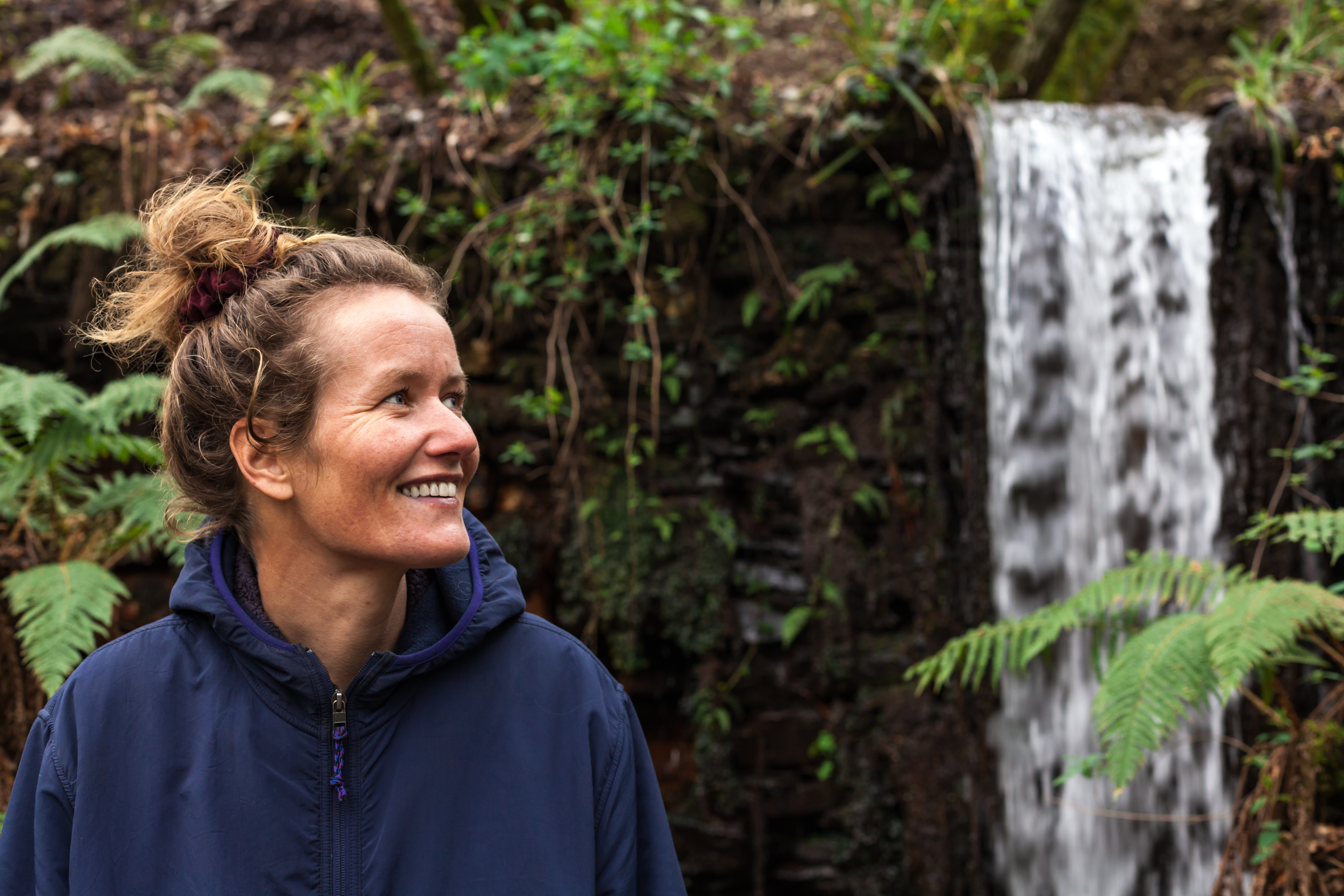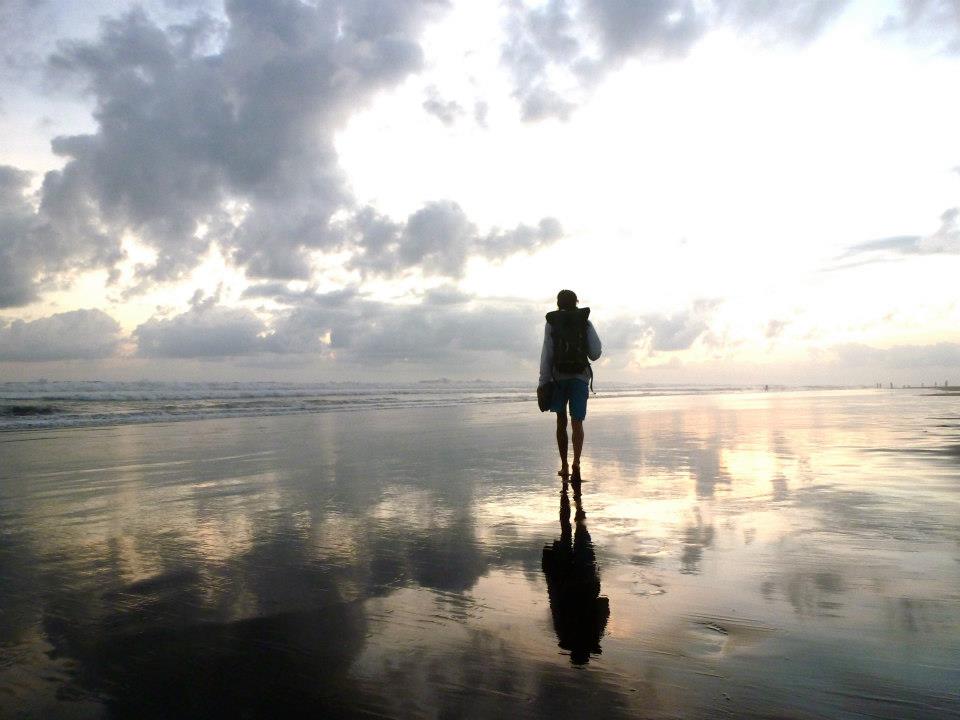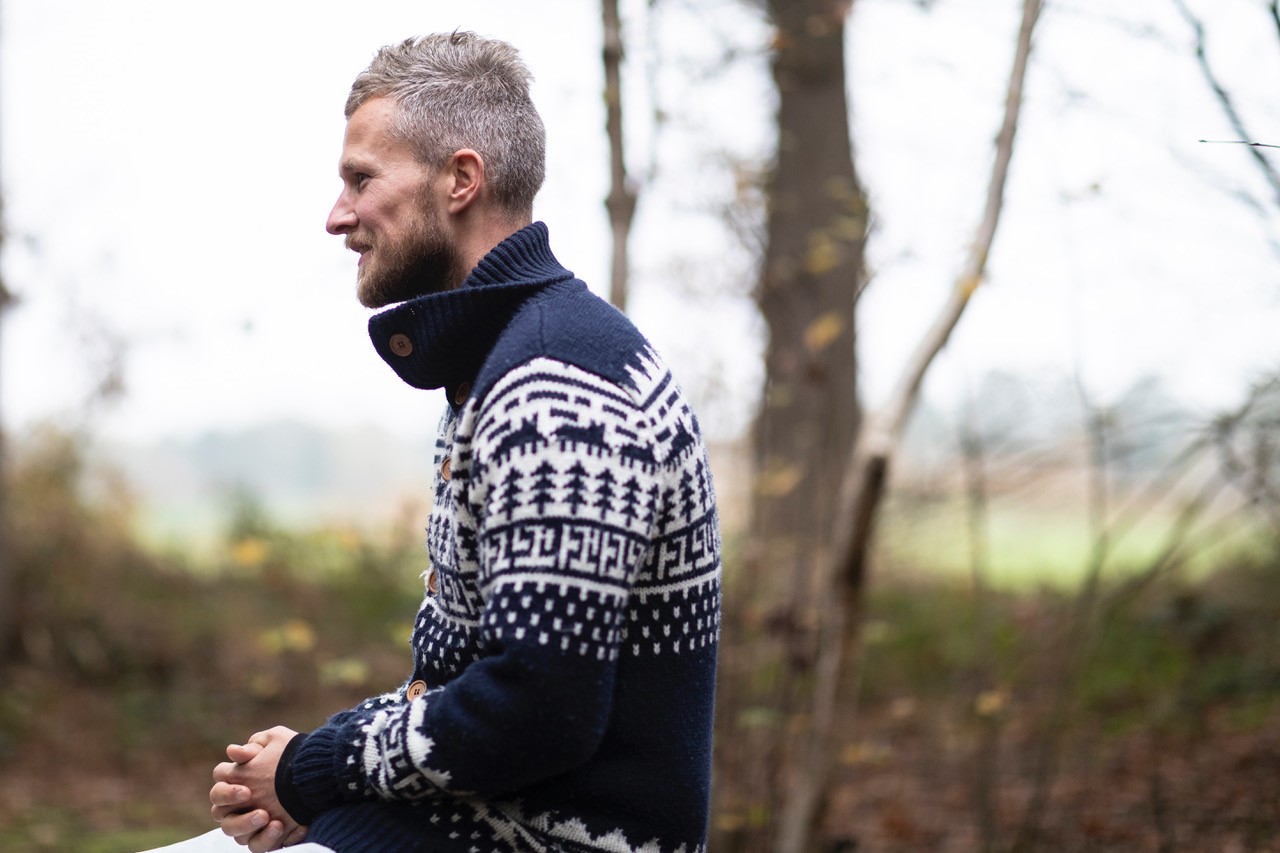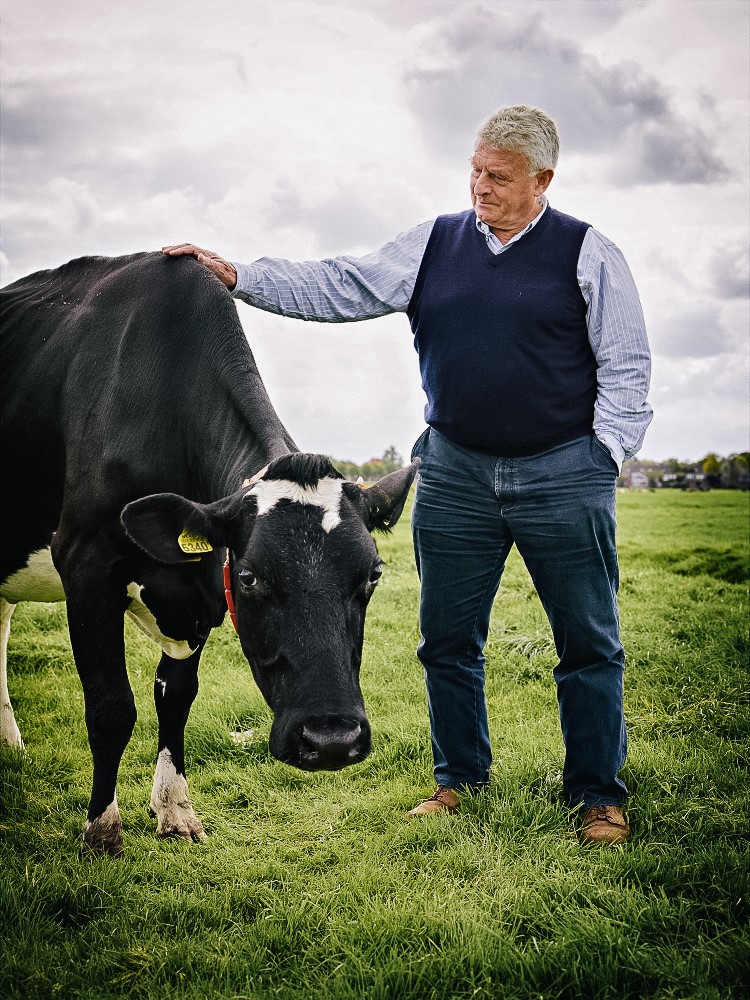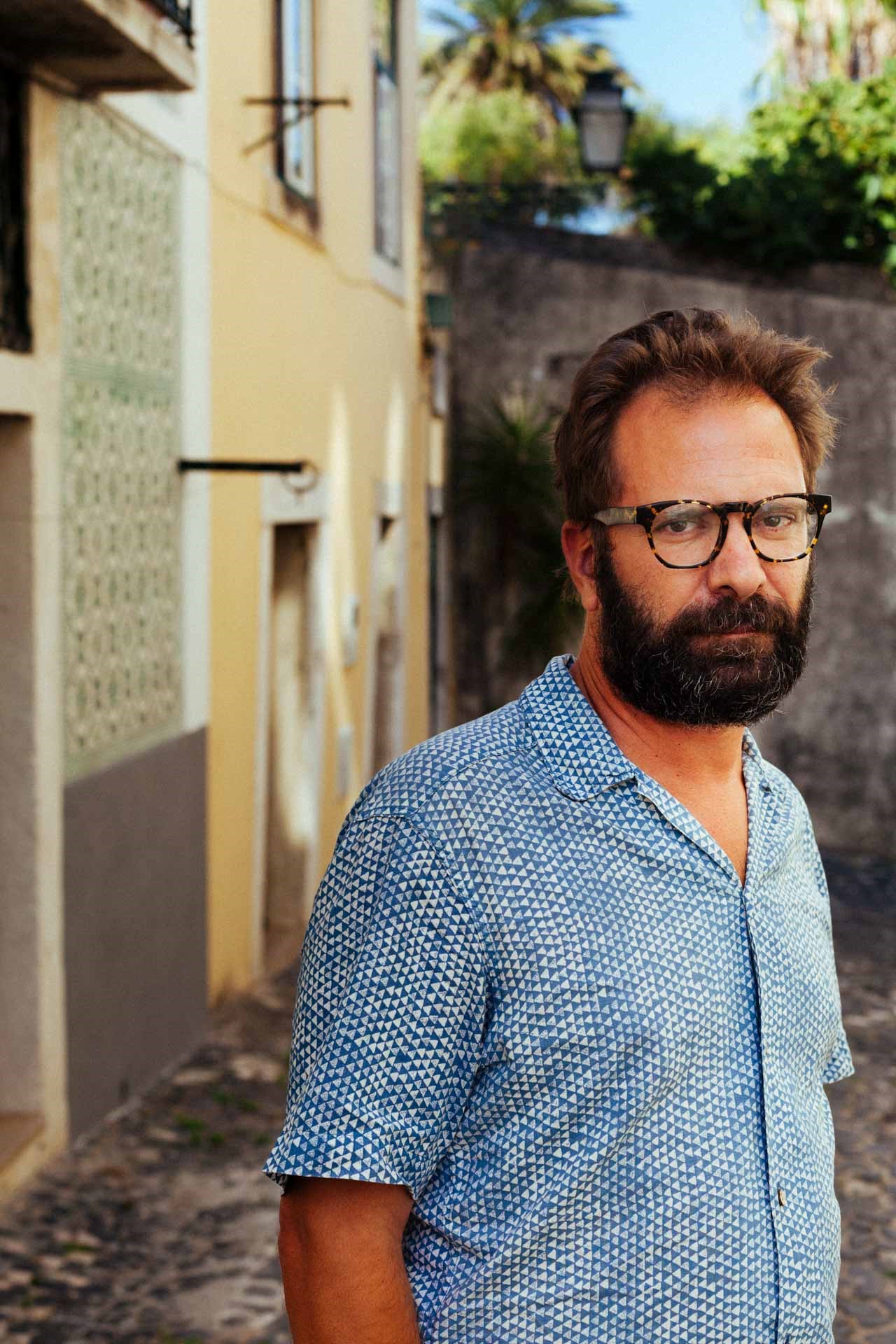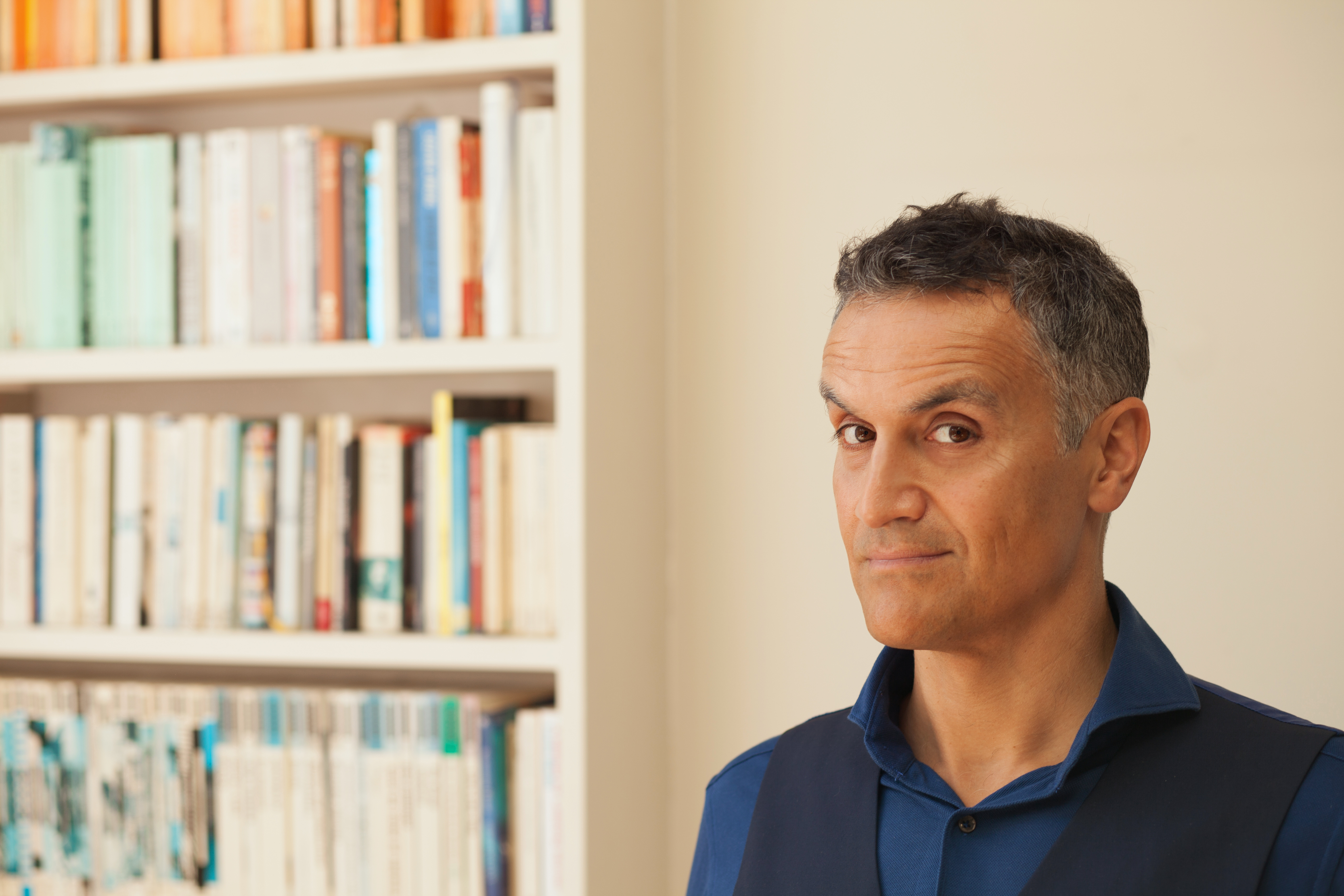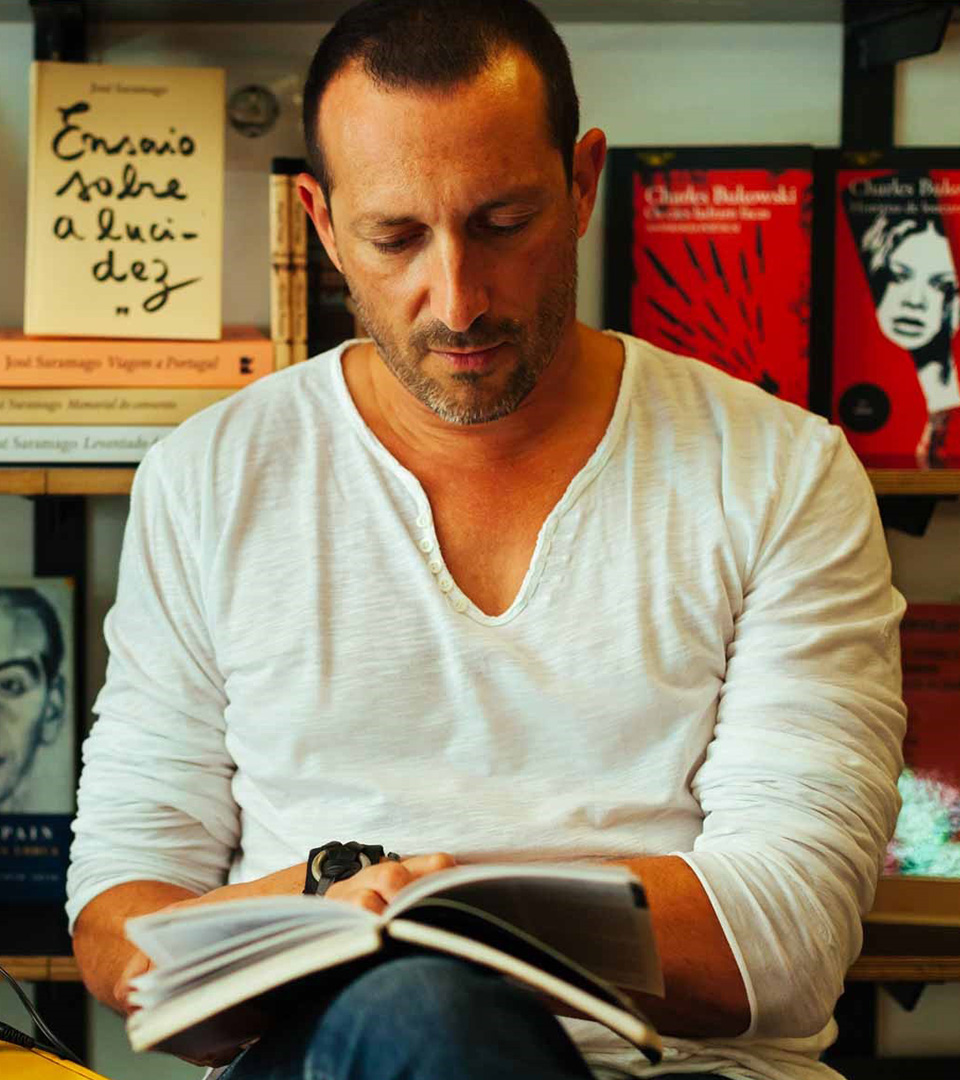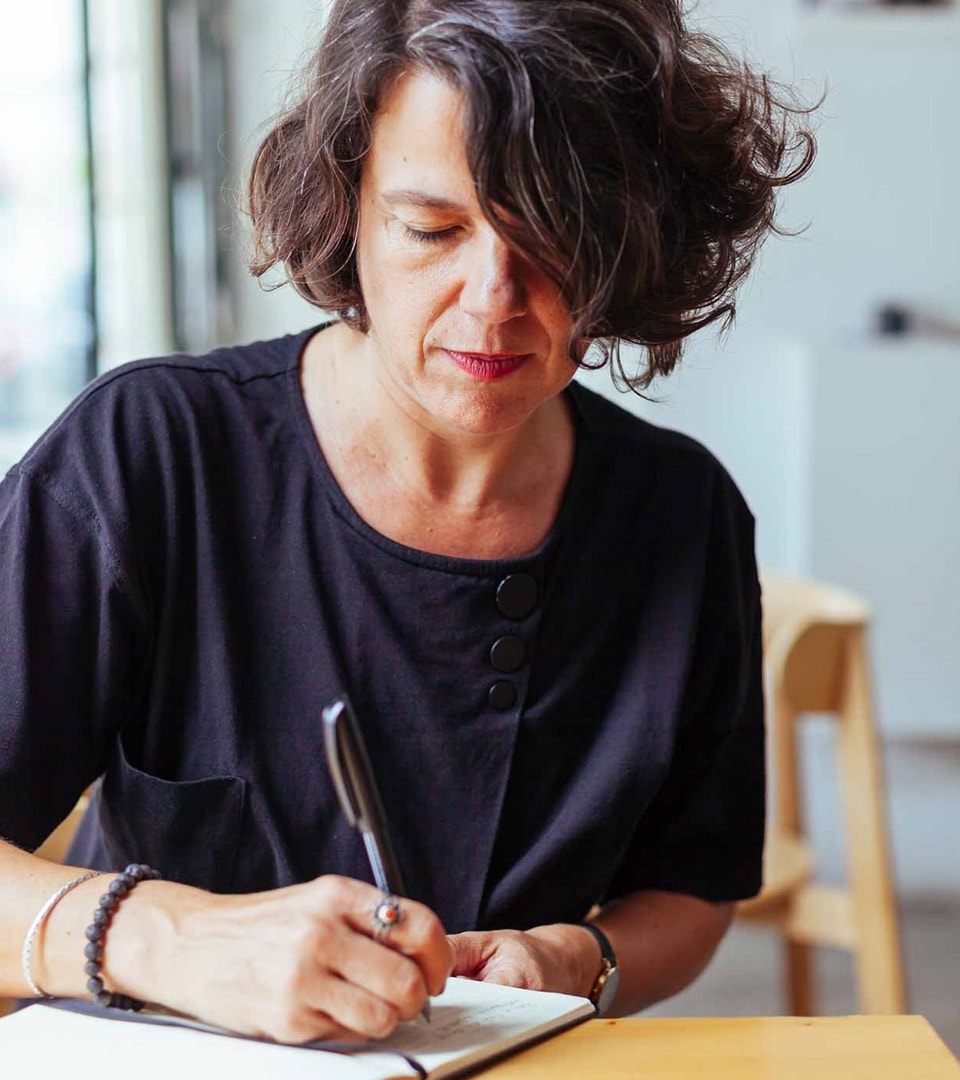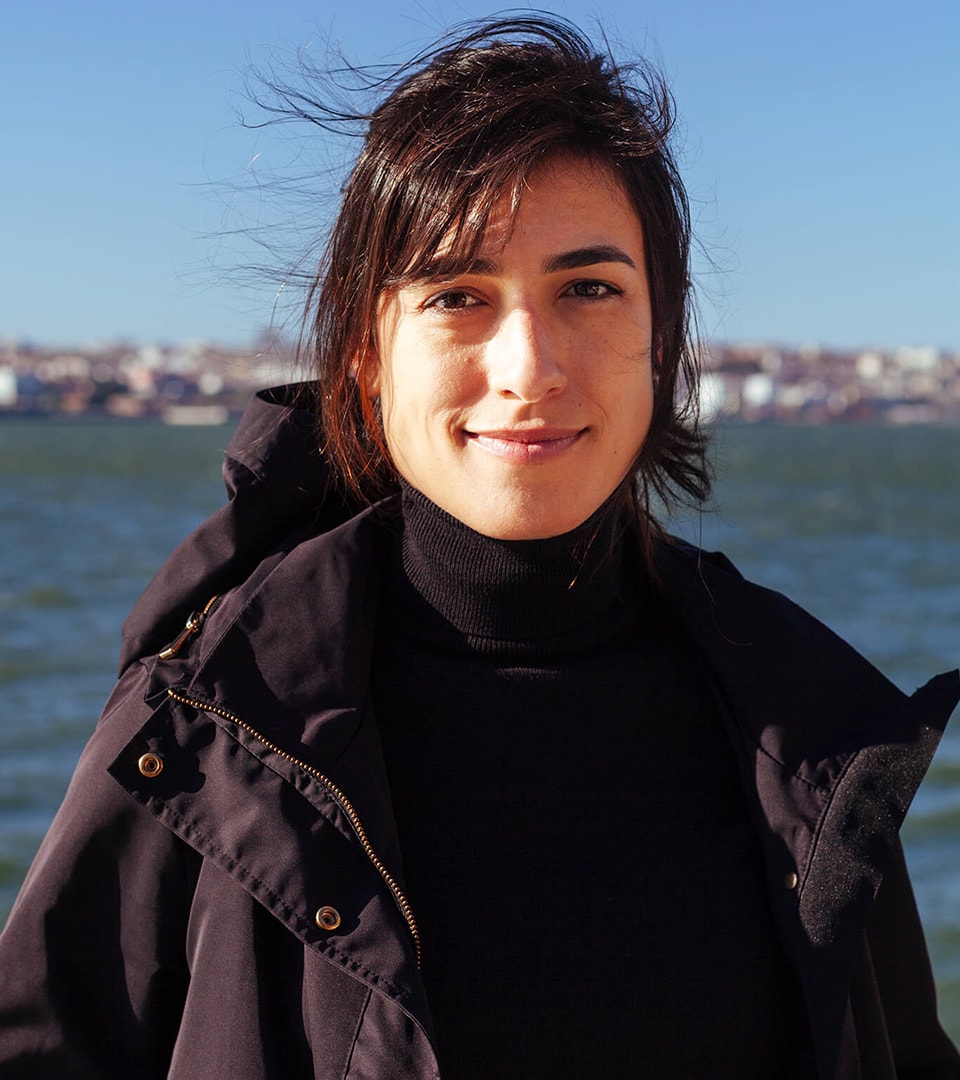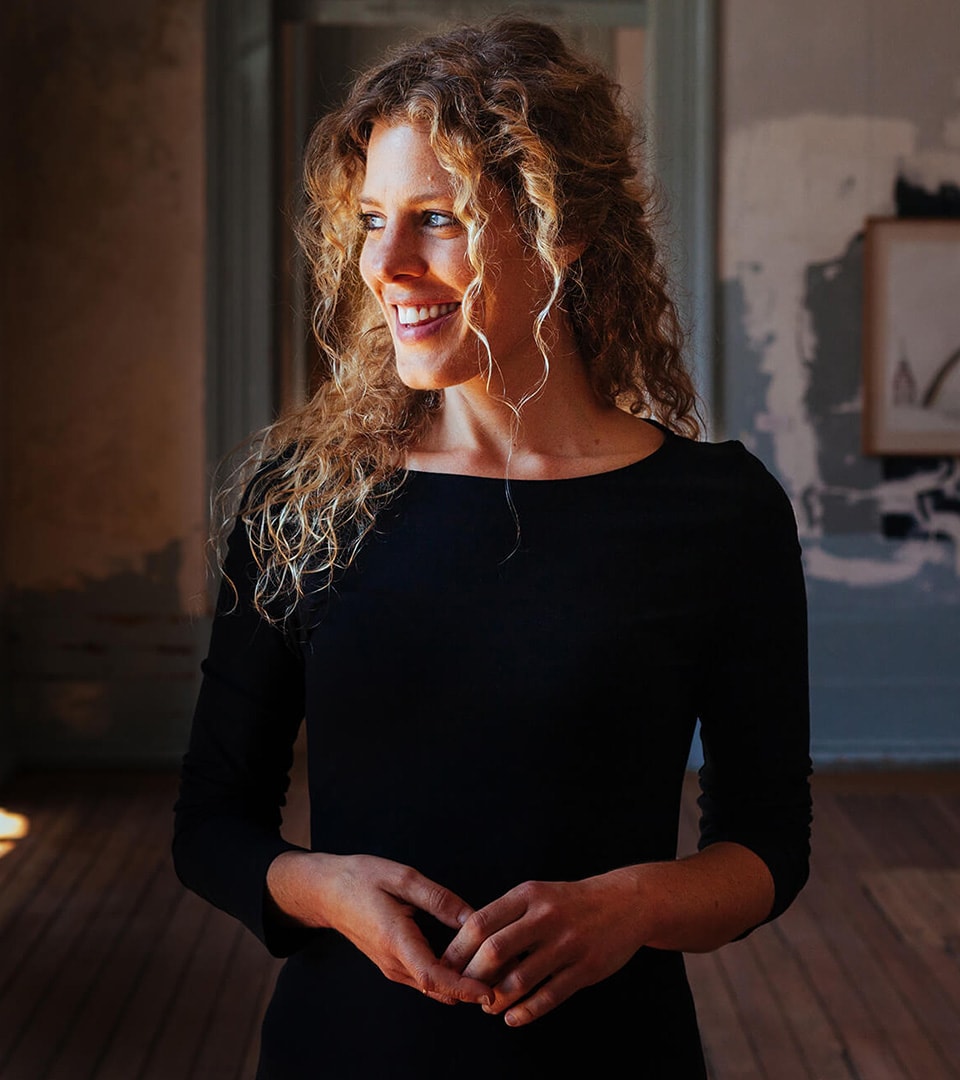AnaBrazão
Interviewed on May 17, 2019 over coffee in the Corações Com Coroa Café, in Lisbon.
The guardian of rivers
The river that flows through her village is the Tagus. Ana Brazão is a Lisboner by accident, not because she was born in the Portuguese capital while in transit, but because Lisbon’s city life leaves little space for her favorite pastimes: rafting, and silent internal dialogues. It was the running of a few rapids, specifically, that helped Ana to abandon a future in chemistry laboratories and allow herself to be carried away by the spectre of environmental activism.
Before that weekend of rafting, trekking and canoeing, organised by GEOTA (GEOTA – Grupo de Estudos de Ordenamento do Território e Ambiente), she had no idea that the rivers were in danger, but by the following Monday the world had gained a more conscious citizen – one who would create the Rios Livres project in defense of free and clean rivers. Some people call her crazy for fighting against unnecessary dams and expropriations without ay or ay, but for us she is a guardian of the rivers, those courses of fresh water that want only to be as fluent as a good conversation.
"It so happens that I'm a very quiet activist, which means that I know how to give priority to things."
"What could be done more slowly? To be with others. To be with yourself. To be. More slowly."
"I'm not from this time because I don't feel as old as I am. I'm a bit of an old soul."
"I like the wisdom that age brings."
"I love cooking, it's my Zen moment. I put on music and stay there for two, three hours. I like to refine and invent."
"It's not fair, they're taking people's time."
"With my grandmother I learned to enjoy being alone, to enjoy spending time with others in silence."
"I can be with my grandmother all afternoon in silence, doing something together."
"There is a level of harmony with the ecosystem that has already graduated on to the level of poetry. That spirit is very beautiful."
On a hot May afternoon, between coffees and glasses of water, we aimed for a rapid understanding: what is a free river, after all? The answer came in two parts: the first technical, and the second emotional. “Technically, a free river is one that has had no alteration to its morphology. That is, the bed and the banks were not altered, there was no artificial regularization of the river. This is very rare nowadays. Some changes are natural; the rivers are dynamic and can change their course. The question is when it’s us who are changing them: we decimate the ecosystem because it’s not in harmony with the dynamics of sand, fauna and flora. To completely change the physiognomy of a river is to block it. A study came out last week that says that only one third of the world’s main rivers are still free. It is the complete alteration of the natural laws of the planet, all in favor of capturing and building more.”
What about the emotional side? “I don’t know if you’ve ever gone rafting or canoeing. There’s another feeling there. The fact that you’re just one more in the middle of what’s around you versus being in a stagnant, rotten, almost lifeless lake of water. It’s not the same experience. It’s one of the few places that is still true.” So is a dam always a bad idea? “Careful: dams are necessary for a lot of things, and we will continue to need them for a long time to come. What we argue is that you don’t need so many. In a country like Portugal we are talking about 8,000 barriers in our rivers, between dams, large dams, small dams and mini hydroelectric dams. They are more than enough. Rivers are the veins of the Earth and the main natural cycles (of water, nitrogen, soil recovery), they are also the ones that transport the sediments that prevent coastal erosion. Blocking a river is like blocking a vein. The system may continue to live, but we’re going to have a serious health problem.”
The objective of the Rios Livres project and GEOTA is to save these veins, to prevent planetary heart attacks. Ana’s first step toward becoming an ‘environmental cardiologist’ took place in the idyllic scenarios of the Sabor and Tua rivers. “When you spend 3 or 4 days in places that will disappear from the map within a few months, that marks you. It was a place of such beauty, such absolutely unparalleled fullness of landscapes. I joined as a volunteer, and suddenly eight years have passed.”
In between, Ana created the Rios Livres Project “together with other volunteers. We were friends and we started to do guerrilla warfare, campaigns, demonstrations, activism…” After graduating with a bachelor’s degree in chemistry she took a master’s degree in environmental studies, and worked a few years in environmental chemistry and chemistry research “until I realized that the research I was doing was useless and even aggravated the problems. You’re always funded by someone. When you’re working for a pharmacist it’s less bad, but if you’re working for agro-chemistry, for industry…”
According to Ana, even the studies done in university laboratories can be subject to, and are implemented by, polluting industries. “The design of our economy makes no sense, and so I decided to change.”
The spectre of activism surged, and the solution for changing the wild economy resumed itself in one term: anti-growth.
Is it possible that capitalism’s days are numbered? “Beginning with the fact that we measure our development in GDP, which always presupposes the extraction of a resource and the associated profits. If you were to have a great catastrophe, a big tsunami for example, and we needed a huge investment to recuperate what had been destroyed, GDP will go up. Thousands of people would die, maybe everything would have been destroyed, but that’s what happens. It doesn’t make any sense at all to continue to measure ourselves, as a society, with an indicator that always implies more exploitation. And we’re running out of resources to exploit in the world.”
Do we have to adopt the GIH (Gross Internal Happiness)? “Yes, Bhutan measures the happiness index. They only accept 6 thousand people per year. 6 thousand visas. I’d really love to go.”
Given that all of us moving to Bhutan is impossible, what would be the best solution for humanity? Pausing a little to pay attention to the imbalances that we find in every corner? “Maybe we can return to understanding what it is that really has value. The consumer thinks: what is it that I see? What is it that I eat? Where do I go? But no one asks about themselves as a citizen.”
Ana points out that, as a consumer, there are many issues to take into account: to use or not to use a biodegradable drinking straw, to choose or not to choose recyclable plastics, to eat or not to eat meat. But she believes that it is far from being enough. “Even if I have the most ecological type of life, alone I won’t be able to change the vast majority of the processes of environmental destruction that exist in the world. Only when we think less about self and consumption will we change.”
It involves moving towards a sharing economy, which means consuming less – and not just more sustainable consumption. Can this change take several generations to happen? “There is a certain outsourcing of consciousness, ‘this is no longer us who are going to change’. It is always the next generations. But no, it is now. It is now that we make this change.”
Shifting gears in steep streets and the injustice of expropriations are two situations that make Ana anxious. “On one hand it was environmental engineering that led me to work with rivers, but then there is the human side that leads you to continue to fight. There is a complete discrepancy between the person who makes the decision and the one who suffers from it, who has no say in the decision. They’re expropriating in small pieces and never expropriate in full, so they don’t pay for the property in full, and they make your life impossible. Destroying people with fatigue. I don’t know if it’s the thing that makes me most uneasy, but it’s the one that makes me swear the most.”
And what makes an activist quiet? “It so happens that I’m a very quiet activist, which involves knowing how to give priority to things. There are many environmentalists who enter into such a process of stress and anguish that they can’t stop talking about it and even enter into a process of burnout. I can somehow shut down and do the things I like. I continue to take the walks I’ve always done, sunbathe, read a book a month, drink tea or a glass of wine… in other words, emotional stability has to be maintained.”
In other words, she manages to separate the waters. “It’s tiring to have to deal with problems when you’re told that there’s been another discharge in the Tagus and it’s 9 a.m. on a Sunday. It’s more uncertain whether you can reconcile your professional and personal life. If you don’t take it easy, it’s more difficult.”
“What could be done more slowly? To be with others. To be with yourself. To be. More slowly. It’s about what you value or not, at the end of the day, and how I think we’re always valuing the wrong things.”
Between two glasses of cold water, we wondered what might be the most urgent issue to correct in the world, and Ana answered without hesitation: Corruption. Lack of transparency. Lack of involvement. That’s it: if each one of us is not involved in decision-making, it makes us very focused on ourselves and on the things we can do to improve our own well-being or that of the few around us.”
The conversation begins to circulate around a very Portuguese theme: the defeatist discourse of disbelief, with arms crossed over the chest, and a metaphorical bubble given to the world by advertisements for a probiotic yogurt. “There is constant indignation on the part of people, but very little action. If you feel that you are free to think ‘I would like the world to be more this or more that,’ if you think that by doing a, b, c and d to get there, limited only by the normal obstacles of democracy, with systems that bring together the opinions of various people, you feel much more empowered to change things around you. Now, if you have systems that are obscure, and corrupted inside – if the processes are slow – if you feel that you lack power as a citizen – then you have a tendency to put on blinders, and dedicate yourself to change only the things immediately around you. Everyone will be like that, all in the L Casei Immunitas bubble, centered on themselves (with all due respect for the introspective types).”
Problems with the natural environment and the rivers “are always related to some fault in the process, to some absolutely corrupted procedure. There is always something that smells bad.”
Ana has never confronted a truly corrupt person face to face, but those who have been compromised by corrupt people? Yes. “It’s obvious that the response isn’t good. You’re greeted with a full arsenal of arguments, and they do the worst possible thing to you: they don’t have an argument about the action you are discussing. They start by putting the ‘crazy in the head’ label on you: fundamentalist environmentalist, extremist. I’ve even been called a terrorist.”
How do you explain to someone like that, with all the calm in the world, the importance of an activist’s work? Ana follows Mark Twain’s rule: “Never argue with an idiot. He’ll drag you down to his level, and then beats you with experience.… When someone calls you a terrorist or an extremist, that’s just a conversation not to have. In other cases I only get to the activism at the end of the explanation. First I say that I work in nature conservation, and then people realize that it is important. And what does that imply? It implies being an activist.”
For some people, the image of an activist means screaming in front of the Assembly of the Republic. Curiously, in fact, the headquarters of the Rios Livres project is just a few streets away from Parliament. “Screaming is so rare. But when you’ve exhausted the possibilities of meetings with decision-makers, from mayors to mayoral candidates, ministers, secretaries of state, deputies – when you no longer have a platform for dialogue and can no longer bring the subject up for public discussion – then you hold public demonstrations.”
The job of activists like Ana is to leave positive viruses in the heads of politicians. “Before the elections there is usually a copy-paste of some of our ideas in their programs, which is perfect – it’s what we want: to influence. Copy everything, please.”
Asked whether she felt herself to be ‘of this time,’ Ana gave us the most immediate answer of all: “No.” Would you like to live in the 14th century? “At that time I would have had few rights as a woman. When I say that I am not of this age, it’s because I don’t feel like I am old enough. I am a bit of an old soul in the things I value as a person. I feel older and have always enjoyed being with older people, learning from older people, programs that tend to be for older people. It has more to do with lifestyle. I like the wisdom that age brings. Knowledge is something you have or don’t have, but when you’re with people who’ve been through other things, they have another way of looking at problems.”
Age aside, does each one of us have a conflict between our inner consumer and our inner citizen? “I have a lot of challenges to think about how people could come back to value something they don’t know, especially in my parents’ age group – about agriculture before pesticides. I don’t know if this knowledge has been lost, if there is a clear vision for some generations about time and quality versus quantity. In recent decades, this myth of the need for a certain type of agriculture in order to feed the world has been sold.”
And how do we go back to an era without pesticides? “Soils have a rhythm, the use of water resources has a cycle. The fact that we are wearing down the soil and making it less and less fertile by adding chemicals leads to a loss of quality in the long run. So we need a product that tends to take longer to produce, and yields per hectare will be lower too, but I’ll have much better quality and much more respect for future generations by preserving resources that I can’t replace. I can’t make soil and I can’t make water.”
So how do you feed, 7 billion mouths? “We must remember that 1/3 of the world’s food is wasted along the way. Maybe the problem is not to feed nearly 8 billion, but to know where the food is distributed. It’s the same with dams: the vast majority are for agriculture, but then you’ll see the fields and they have no form of natural retention for the water where it falls. You see fields completely terraced with morphology adapted to get the maximum extraction per hectare and you have no way to ensure diversity of species planted. That is, when there is a pest everything goes to eito, because it is just a crop. If you had small retention basins it would be necessary to water much less. With crop rotation and alteration, each of those plants could take different nutrients from the soil, and deposit others that are needed for the next crop.”
And suddenly the conversation came around to the unadulterated flavor of a real tomato, without chemicals, without hurry -s and Ana congratulated herself. “It’s good that there are these examples because 10 years ago, talking about organic farming was talking about gourmet. And today you go to a normal supermarket and already have multiple options for olive oil, wine, almost everything, in organic version. The message is very positive: there are companies that manage to do business normally. I won’t even discuss the profit rates – that is, they fit into the market but also respect the rhythms of nature.”
Unfortunately, most companies still live according to the logic of increasing profits every year, and as long as this paradigm does not change… “There may have to be a limit to profit, but that is another debate. As far as I know, there are only wage caps (in countries like Denmark) and the ratios between the person who earns the most and the person who earns the least in a company. With a maximum profit margin, the distribution of wealth would be more fair.”
The work of an activist involves a lot of pressure on the political class, and she believes that this change begins in small communities more than in the form of “macro” changes at the level of the State or the European Union. “I believe in bottom-up: more and more people putting upward pressure and demonstrating that something has to change. The issue of animal rights was a movement that came from underneath and rose to the top. Today animals are much better defended.”
With all the information available, what would a conscious consumer look like today? Should those who eat meat and use plastic bags feel a little guilty? “I am a flexitarian: mostly a vegetarian, but I make the exceptions I want, as long as it’s not an endangered species like tuna or sardines.” Ana tries to be a conscious consumer and doesn’t go along with the epithet of ‘fundamentalist’ that people call people who cut radically with meat and suchlike. “Those who make decisions in a more strict way than I do are not necessarily fundamentalists: they are someone with concern for general welfare. To see these people as more or less extremist does not make sense. They are making a decision that deserves to be respected.”
When you eat meat every day, you probably won’t suffer the consequences, but the next generation will for sure. On the other hand, Ana never forgets that environmental information doesn’t reach everyone, whether they live in Freixo-de-Espada-a-a-Cinta or receive €600 a month, spending hours between work, school and home, without time to soak the cod. “Rapid consumption became a symbol of improved quality of life, and that’s the end of bulk beans. Of course it’s practical: opening a can of cooked beans to make your food saves you time. But this saving of time, when you add everyone up, leads to the complete exhaustion of our resources.”
On the other hand, the time you save cooking doesn’t always go to the best ends. “That faster consumption of canned beans has just given you more time to work.”
We live in hurried times of fast food and hasty meals, but it’s important to learn how to purify more. The kitchen has something to teach us: everything has a time. You can’t fake the rising time of a bread dough. “I love cooking, it’s my Zen moment. I put on music and stay there for two or three hours. I like to refine and invent.”
Among the 10 million Portuguese there are very few who have the luxury of time for themselves and their families. “I invented the good side of public transport: I save on a car, it’s an environmental solution and I read one book a month. But people work too hard lose quality of life. It’s almost inevitable to have a car, to make cuisine a pre-made thing that you order… It’s sad that people have been forced to live this lifestyle.”
The activist thinks out loud: “Maybe another rule that should be created is to have a limit on working hours,” that is, labor laws that are impossible to falsify with the trick of overtime – which seem to have no legal limits. “It’s not fair, they’re taking people’s time.”
One of the most special missions in which Ana got involved was aimed at protecting one of Portugal’s most beautiful rivers (ideal for wildwater sports). The Plataforma Salvar o Tua warned of the monumental folly of the construction of the Foz Tua Dam, which was to submerge hundreds of hectares of agricultural land in the Douro Vinhateiro region (a Unesco world heritage site). EDP’s project had the ambitious goal of producing 0.1% of the country’s energy. “I met Esporão during Tua’s campaign last year. They produced four mini-documentaries made by Jorge Pelicano that served to promote the platform’s website. When we launched the site the dam was very close to being completed, but I don’t remember an environmental campaign that had a result like that. 22 thousand letters and emails sent to UNESCO! There are many thousands of people. It wasn’t in time, but it did something. In the process, we managed to change the perception that dams are always positive. ‘Everything that is renewable is good’ – this is a myth.
In one of the documentaries we can hear Pedro Duarte, a farmer affected by the dam, say ‘not all the money in the world pays for the trees that I and the young people of this land have planted and that have already disappeared’.”
The challenges – of activists, and of farmers on the verge of seeing their future drowned by stinking waters and commercial developments – are being overcome with persistence. “This is never just one campaign, never just one vote, never just one action, never just one video… it’s everything together. And in the end, we see the difference. There are beautiful efforts and achievements that we can achieve as human beings. Gender equality, for example. The role that women have today compared to 30, 40 years ago. The struggle for LGBTI rights. The fact that a law recently passed that will prohibit fruit and vegetables being packed in plastic. There are things that we, as humanity, are trying to do, and that are even working. The problem is everything that remains to be done.”
What has a woman with an old soul learned from older people? “I have a passion and fascination for the railroad, for the operation of trains. It’s something that came from my grandfather, which I learned from him. With my grandmother I learned to like to be alone, and to like to spend time with others in silence.”
It’s on the other side of the spectrum from a selfie with a photogenic cappuccino (an impeccably decorated coffee with an Instagram filter and an obscene number of likes) where Ana’s confidence comes up: “You don’t have to be doing things and showing that you’re doing things. It’s just being. I can be with my grandmother one afternoon in silence doing something together. That’s when you share certain ideas from other times. And then I feel like I know her.”
For Ana, inspiration from upstream is not exclusively familiar, and reminds her of a story by the banks of the Tâmega River. “He was a wine producer, in the area of Gatão (Amarante), with whom we spent a whole afternoon and night in front of a fireplace, drinking his wine because he didn’t want to talk to us until we passed a test. He recited poems by Camões by heart before he began to explain the importance of the river in his vineyard. His description of the water next door allowing the vineyard to breathe was magnificent: he said that breathing was visible in the early hours. If the river was retained higher, that possibility of sensing the land breathing would disappear. I will never be able to replicate his words, but that knowledge is something that you only find very occasionally.”
Camões, the lord of history, was someone who clearly understood the dynamics of life: the use of land, climate and water, in harmony with the species he planted, until the final product – in this case, wine. “There is a level of harmony with the ecosystem that has already passed to the level of poetry. This spirit is very beautiful.”
The river that flows through her village is the Tagus. Ana Brazão is a Lisboner by accident, not because she was born in the Portuguese capital while in transit, but because Lisbon’s city life leaves little space for her favorite pastimes: rafting, and silent internal dialogues. It was the running of a few rapids, specifically, that helped Ana to abandon a future in chemistry laboratories and allow herself to be carried away by the spectre of environmental activism.
Before that weekend of rafting, trekking and canoeing, organised by GEOTA (GEOTA – Grupo de Estudos de Ordenamento do Território e Ambiente), she had no idea that the rivers were in danger, but by the following Monday the world had gained a more conscious citizen – one who would create the Rios Livres project in defense of free and clean rivers. Some people call her crazy for fighting against unnecessary dams and expropriations without ay or ay, but for us she is a guardian of the rivers, those courses of fresh water that want only to be as fluent as a good conversation.
"It so happens that I'm a very quiet activist, which means that I know how to give priority to things."
"What could be done more slowly? To be with others. To be with yourself. To be. More slowly."
"I'm not from this time because I don't feel as old as I am. I'm a bit of an old soul."
"I like the wisdom that age brings."
"I love cooking, it's my Zen moment. I put on music and stay there for two, three hours. I like to refine and invent."
"It's not fair, they're taking people's time."
"With my grandmother I learned to enjoy being alone, to enjoy spending time with others in silence."
"I can be with my grandmother all afternoon in silence, doing something together."
"There is a level of harmony with the ecosystem that has already graduated on to the level of poetry. That spirit is very beautiful."
On a hot May afternoon, between coffees and glasses of water, we aimed for a rapid understanding: what is a free river, after all? The answer came in two parts: the first technical, and the second emotional. “Technically, a free river is one that has had no alteration to its morphology. That is, the bed and the banks were not altered, there was no artificial regularization of the river. This is very rare nowadays. Some changes are natural; the rivers are dynamic and can change their course. The question is when it’s us who are changing them: we decimate the ecosystem because it’s not in harmony with the dynamics of sand, fauna and flora. To completely change the physiognomy of a river is to block it. A study came out last week that says that only one third of the world’s main rivers are still free. It is the complete alteration of the natural laws of the planet, all in favor of capturing and building more.”
What about the emotional side? “I don’t know if you’ve ever gone rafting or canoeing. There’s another feeling there. The fact that you’re just one more in the middle of what’s around you versus being in a stagnant, rotten, almost lifeless lake of water. It’s not the same experience. It’s one of the few places that is still true.” So is a dam always a bad idea? “Careful: dams are necessary for a lot of things, and we will continue to need them for a long time to come. What we argue is that you don’t need so many. In a country like Portugal we are talking about 8,000 barriers in our rivers, between dams, large dams, small dams and mini hydroelectric dams. They are more than enough. Rivers are the veins of the Earth and the main natural cycles (of water, nitrogen, soil recovery), they are also the ones that transport the sediments that prevent coastal erosion. Blocking a river is like blocking a vein. The system may continue to live, but we’re going to have a serious health problem.”
The objective of the Rios Livres project and GEOTA is to save these veins, to prevent planetary heart attacks. Ana’s first step toward becoming an ‘environmental cardiologist’ took place in the idyllic scenarios of the Sabor and Tua rivers. “When you spend 3 or 4 days in places that will disappear from the map within a few months, that marks you. It was a place of such beauty, such absolutely unparalleled fullness of landscapes. I joined as a volunteer, and suddenly eight years have passed.”
In between, Ana created the Rios Livres Project “together with other volunteers. We were friends and we started to do guerrilla warfare, campaigns, demonstrations, activism…” After graduating with a bachelor’s degree in chemistry she took a master’s degree in environmental studies, and worked a few years in environmental chemistry and chemistry research “until I realized that the research I was doing was useless and even aggravated the problems. You’re always funded by someone. When you’re working for a pharmacist it’s less bad, but if you’re working for agro-chemistry, for industry…”
According to Ana, even the studies done in university laboratories can be subject to, and are implemented by, polluting industries. “The design of our economy makes no sense, and so I decided to change.”
The spectre of activism surged, and the solution for changing the wild economy resumed itself in one term: anti-growth.
Is it possible that capitalism’s days are numbered? “Beginning with the fact that we measure our development in GDP, which always presupposes the extraction of a resource and the associated profits. If you were to have a great catastrophe, a big tsunami for example, and we needed a huge investment to recuperate what had been destroyed, GDP will go up. Thousands of people would die, maybe everything would have been destroyed, but that’s what happens. It doesn’t make any sense at all to continue to measure ourselves, as a society, with an indicator that always implies more exploitation. And we’re running out of resources to exploit in the world.”
Do we have to adopt the GIH (Gross Internal Happiness)? “Yes, Bhutan measures the happiness index. They only accept 6 thousand people per year. 6 thousand visas. I’d really love to go.”
Given that all of us moving to Bhutan is impossible, what would be the best solution for humanity? Pausing a little to pay attention to the imbalances that we find in every corner? “Maybe we can return to understanding what it is that really has value. The consumer thinks: what is it that I see? What is it that I eat? Where do I go? But no one asks about themselves as a citizen.”
Ana points out that, as a consumer, there are many issues to take into account: to use or not to use a biodegradable drinking straw, to choose or not to choose recyclable plastics, to eat or not to eat meat. But she believes that it is far from being enough. “Even if I have the most ecological type of life, alone I won’t be able to change the vast majority of the processes of environmental destruction that exist in the world. Only when we think less about self and consumption will we change.”
It involves moving towards a sharing economy, which means consuming less – and not just more sustainable consumption. Can this change take several generations to happen? “There is a certain outsourcing of consciousness, ‘this is no longer us who are going to change’. It is always the next generations. But no, it is now. It is now that we make this change.”
Shifting gears in steep streets and the injustice of expropriations are two situations that make Ana anxious. “On one hand it was environmental engineering that led me to work with rivers, but then there is the human side that leads you to continue to fight. There is a complete discrepancy between the person who makes the decision and the one who suffers from it, who has no say in the decision. They’re expropriating in small pieces and never expropriate in full, so they don’t pay for the property in full, and they make your life impossible. Destroying people with fatigue. I don’t know if it’s the thing that makes me most uneasy, but it’s the one that makes me swear the most.”
And what makes an activist quiet? “It so happens that I’m a very quiet activist, which involves knowing how to give priority to things. There are many environmentalists who enter into such a process of stress and anguish that they can’t stop talking about it and even enter into a process of burnout. I can somehow shut down and do the things I like. I continue to take the walks I’ve always done, sunbathe, read a book a month, drink tea or a glass of wine… in other words, emotional stability has to be maintained.”
In other words, she manages to separate the waters. “It’s tiring to have to deal with problems when you’re told that there’s been another discharge in the Tagus and it’s 9 a.m. on a Sunday. It’s more uncertain whether you can reconcile your professional and personal life. If you don’t take it easy, it’s more difficult.”
“What could be done more slowly? To be with others. To be with yourself. To be. More slowly. It’s about what you value or not, at the end of the day, and how I think we’re always valuing the wrong things.”
Between two glasses of cold water, we wondered what might be the most urgent issue to correct in the world, and Ana answered without hesitation: Corruption. Lack of transparency. Lack of involvement. That’s it: if each one of us is not involved in decision-making, it makes us very focused on ourselves and on the things we can do to improve our own well-being or that of the few around us.”
The conversation begins to circulate around a very Portuguese theme: the defeatist discourse of disbelief, with arms crossed over the chest, and a metaphorical bubble given to the world by advertisements for a probiotic yogurt. “There is constant indignation on the part of people, but very little action. If you feel that you are free to think ‘I would like the world to be more this or more that,’ if you think that by doing a, b, c and d to get there, limited only by the normal obstacles of democracy, with systems that bring together the opinions of various people, you feel much more empowered to change things around you. Now, if you have systems that are obscure, and corrupted inside – if the processes are slow – if you feel that you lack power as a citizen – then you have a tendency to put on blinders, and dedicate yourself to change only the things immediately around you. Everyone will be like that, all in the L Casei Immunitas bubble, centered on themselves (with all due respect for the introspective types).”
Problems with the natural environment and the rivers “are always related to some fault in the process, to some absolutely corrupted procedure. There is always something that smells bad.”
Ana has never confronted a truly corrupt person face to face, but those who have been compromised by corrupt people? Yes. “It’s obvious that the response isn’t good. You’re greeted with a full arsenal of arguments, and they do the worst possible thing to you: they don’t have an argument about the action you are discussing. They start by putting the ‘crazy in the head’ label on you: fundamentalist environmentalist, extremist. I’ve even been called a terrorist.”
How do you explain to someone like that, with all the calm in the world, the importance of an activist’s work? Ana follows Mark Twain’s rule: “Never argue with an idiot. He’ll drag you down to his level, and then beats you with experience.… When someone calls you a terrorist or an extremist, that’s just a conversation not to have. In other cases I only get to the activism at the end of the explanation. First I say that I work in nature conservation, and then people realize that it is important. And what does that imply? It implies being an activist.”
For some people, the image of an activist means screaming in front of the Assembly of the Republic. Curiously, in fact, the headquarters of the Rios Livres project is just a few streets away from Parliament. “Screaming is so rare. But when you’ve exhausted the possibilities of meetings with decision-makers, from mayors to mayoral candidates, ministers, secretaries of state, deputies – when you no longer have a platform for dialogue and can no longer bring the subject up for public discussion – then you hold public demonstrations.”
The job of activists like Ana is to leave positive viruses in the heads of politicians. “Before the elections there is usually a copy-paste of some of our ideas in their programs, which is perfect – it’s what we want: to influence. Copy everything, please.”
Asked whether she felt herself to be ‘of this time,’ Ana gave us the most immediate answer of all: “No.” Would you like to live in the 14th century? “At that time I would have had few rights as a woman. When I say that I am not of this age, it’s because I don’t feel like I am old enough. I am a bit of an old soul in the things I value as a person. I feel older and have always enjoyed being with older people, learning from older people, programs that tend to be for older people. It has more to do with lifestyle. I like the wisdom that age brings. Knowledge is something you have or don’t have, but when you’re with people who’ve been through other things, they have another way of looking at problems.”
Age aside, does each one of us have a conflict between our inner consumer and our inner citizen? “I have a lot of challenges to think about how people could come back to value something they don’t know, especially in my parents’ age group – about agriculture before pesticides. I don’t know if this knowledge has been lost, if there is a clear vision for some generations about time and quality versus quantity. In recent decades, this myth of the need for a certain type of agriculture in order to feed the world has been sold.”
And how do we go back to an era without pesticides? “Soils have a rhythm, the use of water resources has a cycle. The fact that we are wearing down the soil and making it less and less fertile by adding chemicals leads to a loss of quality in the long run. So we need a product that tends to take longer to produce, and yields per hectare will be lower too, but I’ll have much better quality and much more respect for future generations by preserving resources that I can’t replace. I can’t make soil and I can’t make water.”
So how do you feed, 7 billion mouths? “We must remember that 1/3 of the world’s food is wasted along the way. Maybe the problem is not to feed nearly 8 billion, but to know where the food is distributed. It’s the same with dams: the vast majority are for agriculture, but then you’ll see the fields and they have no form of natural retention for the water where it falls. You see fields completely terraced with morphology adapted to get the maximum extraction per hectare and you have no way to ensure diversity of species planted. That is, when there is a pest everything goes to eito, because it is just a crop. If you had small retention basins it would be necessary to water much less. With crop rotation and alteration, each of those plants could take different nutrients from the soil, and deposit others that are needed for the next crop.”
And suddenly the conversation came around to the unadulterated flavor of a real tomato, without chemicals, without hurry -s and Ana congratulated herself. “It’s good that there are these examples because 10 years ago, talking about organic farming was talking about gourmet. And today you go to a normal supermarket and already have multiple options for olive oil, wine, almost everything, in organic version. The message is very positive: there are companies that manage to do business normally. I won’t even discuss the profit rates – that is, they fit into the market but also respect the rhythms of nature.”
Unfortunately, most companies still live according to the logic of increasing profits every year, and as long as this paradigm does not change… “There may have to be a limit to profit, but that is another debate. As far as I know, there are only wage caps (in countries like Denmark) and the ratios between the person who earns the most and the person who earns the least in a company. With a maximum profit margin, the distribution of wealth would be more fair.”
The work of an activist involves a lot of pressure on the political class, and she believes that this change begins in small communities more than in the form of “macro” changes at the level of the State or the European Union. “I believe in bottom-up: more and more people putting upward pressure and demonstrating that something has to change. The issue of animal rights was a movement that came from underneath and rose to the top. Today animals are much better defended.”
With all the information available, what would a conscious consumer look like today? Should those who eat meat and use plastic bags feel a little guilty? “I am a flexitarian: mostly a vegetarian, but I make the exceptions I want, as long as it’s not an endangered species like tuna or sardines.” Ana tries to be a conscious consumer and doesn’t go along with the epithet of ‘fundamentalist’ that people call people who cut radically with meat and suchlike. “Those who make decisions in a more strict way than I do are not necessarily fundamentalists: they are someone with concern for general welfare. To see these people as more or less extremist does not make sense. They are making a decision that deserves to be respected.”
When you eat meat every day, you probably won’t suffer the consequences, but the next generation will for sure. On the other hand, Ana never forgets that environmental information doesn’t reach everyone, whether they live in Freixo-de-Espada-a-a-Cinta or receive €600 a month, spending hours between work, school and home, without time to soak the cod. “Rapid consumption became a symbol of improved quality of life, and that’s the end of bulk beans. Of course it’s practical: opening a can of cooked beans to make your food saves you time. But this saving of time, when you add everyone up, leads to the complete exhaustion of our resources.”
On the other hand, the time you save cooking doesn’t always go to the best ends. “That faster consumption of canned beans has just given you more time to work.”
We live in hurried times of fast food and hasty meals, but it’s important to learn how to purify more. The kitchen has something to teach us: everything has a time. You can’t fake the rising time of a bread dough. “I love cooking, it’s my Zen moment. I put on music and stay there for two or three hours. I like to refine and invent.”
Among the 10 million Portuguese there are very few who have the luxury of time for themselves and their families. “I invented the good side of public transport: I save on a car, it’s an environmental solution and I read one book a month. But people work too hard lose quality of life. It’s almost inevitable to have a car, to make cuisine a pre-made thing that you order… It’s sad that people have been forced to live this lifestyle.”
The activist thinks out loud: “Maybe another rule that should be created is to have a limit on working hours,” that is, labor laws that are impossible to falsify with the trick of overtime – which seem to have no legal limits. “It’s not fair, they’re taking people’s time.”
One of the most special missions in which Ana got involved was aimed at protecting one of Portugal’s most beautiful rivers (ideal for wildwater sports). The Plataforma Salvar o Tua warned of the monumental folly of the construction of the Foz Tua Dam, which was to submerge hundreds of hectares of agricultural land in the Douro Vinhateiro region (a Unesco world heritage site). EDP’s project had the ambitious goal of producing 0.1% of the country’s energy. “I met Esporão during Tua’s campaign last year. They produced four mini-documentaries made by Jorge Pelicano that served to promote the platform’s website. When we launched the site the dam was very close to being completed, but I don’t remember an environmental campaign that had a result like that. 22 thousand letters and emails sent to UNESCO! There are many thousands of people. It wasn’t in time, but it did something. In the process, we managed to change the perception that dams are always positive. ‘Everything that is renewable is good’ – this is a myth.
In one of the documentaries we can hear Pedro Duarte, a farmer affected by the dam, say ‘not all the money in the world pays for the trees that I and the young people of this land have planted and that have already disappeared’.”
The challenges – of activists, and of farmers on the verge of seeing their future drowned by stinking waters and commercial developments – are being overcome with persistence. “This is never just one campaign, never just one vote, never just one action, never just one video… it’s everything together. And in the end, we see the difference. There are beautiful efforts and achievements that we can achieve as human beings. Gender equality, for example. The role that women have today compared to 30, 40 years ago. The struggle for LGBTI rights. The fact that a law recently passed that will prohibit fruit and vegetables being packed in plastic. There are things that we, as humanity, are trying to do, and that are even working. The problem is everything that remains to be done.”
What has a woman with an old soul learned from older people? “I have a passion and fascination for the railroad, for the operation of trains. It’s something that came from my grandfather, which I learned from him. With my grandmother I learned to like to be alone, and to like to spend time with others in silence.”
It’s on the other side of the spectrum from a selfie with a photogenic cappuccino (an impeccably decorated coffee with an Instagram filter and an obscene number of likes) where Ana’s confidence comes up: “You don’t have to be doing things and showing that you’re doing things. It’s just being. I can be with my grandmother one afternoon in silence doing something together. That’s when you share certain ideas from other times. And then I feel like I know her.”
For Ana, inspiration from upstream is not exclusively familiar, and reminds her of a story by the banks of the Tâmega River. “He was a wine producer, in the area of Gatão (Amarante), with whom we spent a whole afternoon and night in front of a fireplace, drinking his wine because he didn’t want to talk to us until we passed a test. He recited poems by Camões by heart before he began to explain the importance of the river in his vineyard. His description of the water next door allowing the vineyard to breathe was magnificent: he said that breathing was visible in the early hours. If the river was retained higher, that possibility of sensing the land breathing would disappear. I will never be able to replicate his words, but that knowledge is something that you only find very occasionally.”
Camões, the lord of history, was someone who clearly understood the dynamics of life: the use of land, climate and water, in harmony with the species he planted, until the final product – in this case, wine. “There is a level of harmony with the ecosystem that has already passed to the level of poetry. This spirit is very beautiful.”
AnaBrazão
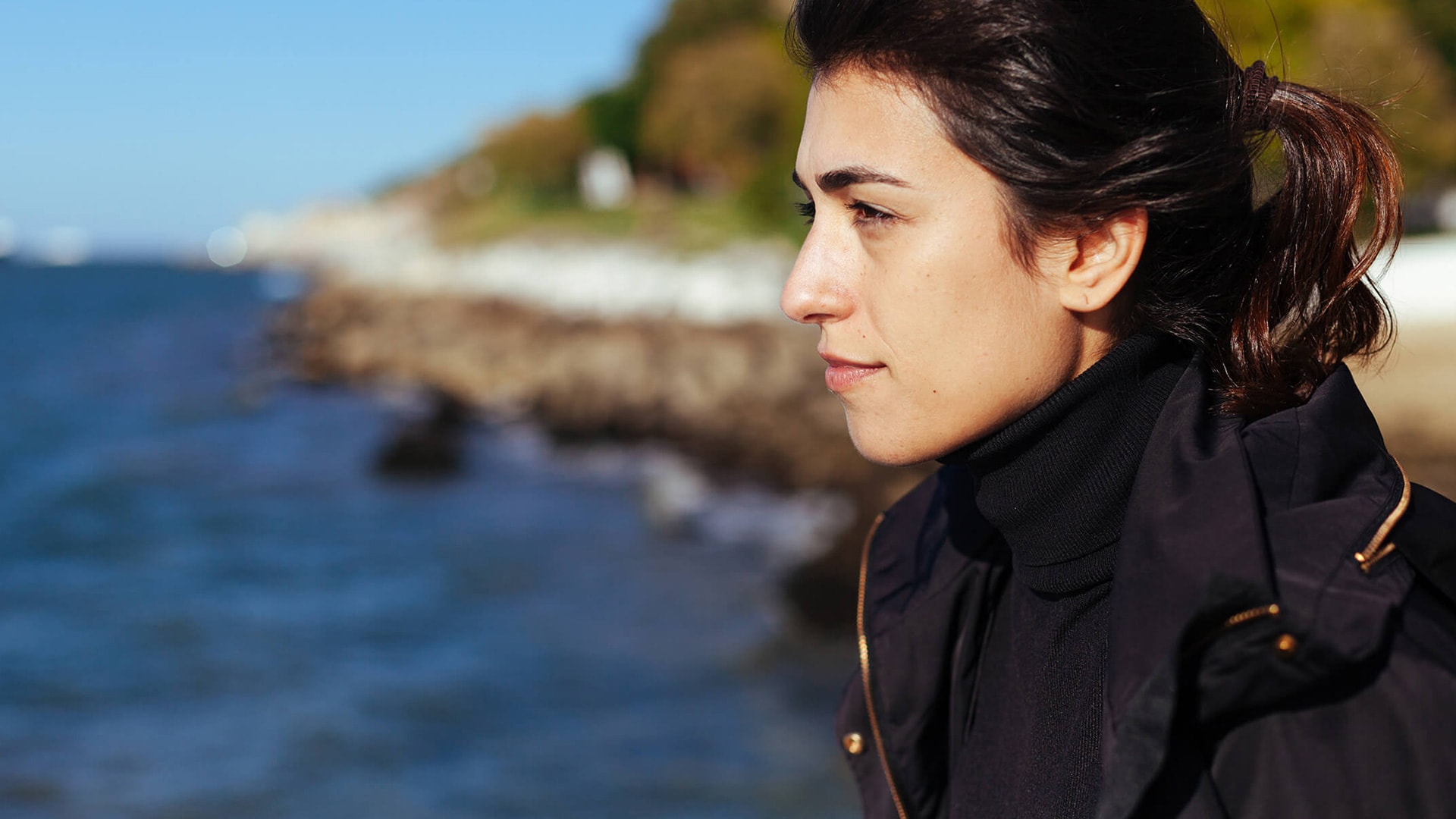
The guardian of rivers
Interviewed on May 17, 2019 over coffee in the Corações Com Coroa Café, in Lisbon.
The river that flows through her village is the Tagus. Ana Brazão is a Lisboner by accident, not because she was born in the Portuguese capital while in transit, but because Lisbon’s city life leaves little space for her favorite pastimes: rafting, and silent internal dialogues. It was the running of a few rapids, specifically, that helped Ana to abandon a future in chemistry laboratories and allow herself to be carried away by the spectre of environmental activism.
Before that weekend of rafting, trekking and canoeing, organised by GEOTA (GEOTA – Grupo de Estudos de Ordenamento do Território e Ambiente), she had no idea that the rivers were in danger, but by the following Monday the world had gained a more conscious citizen – one who would create the Rios Livres project in defense of free and clean rivers. Some people call her crazy for fighting against unnecessary dams and expropriations without ay or ay, but for us she is a guardian of the rivers, those courses of fresh water that want only to be as fluent as a good conversation.
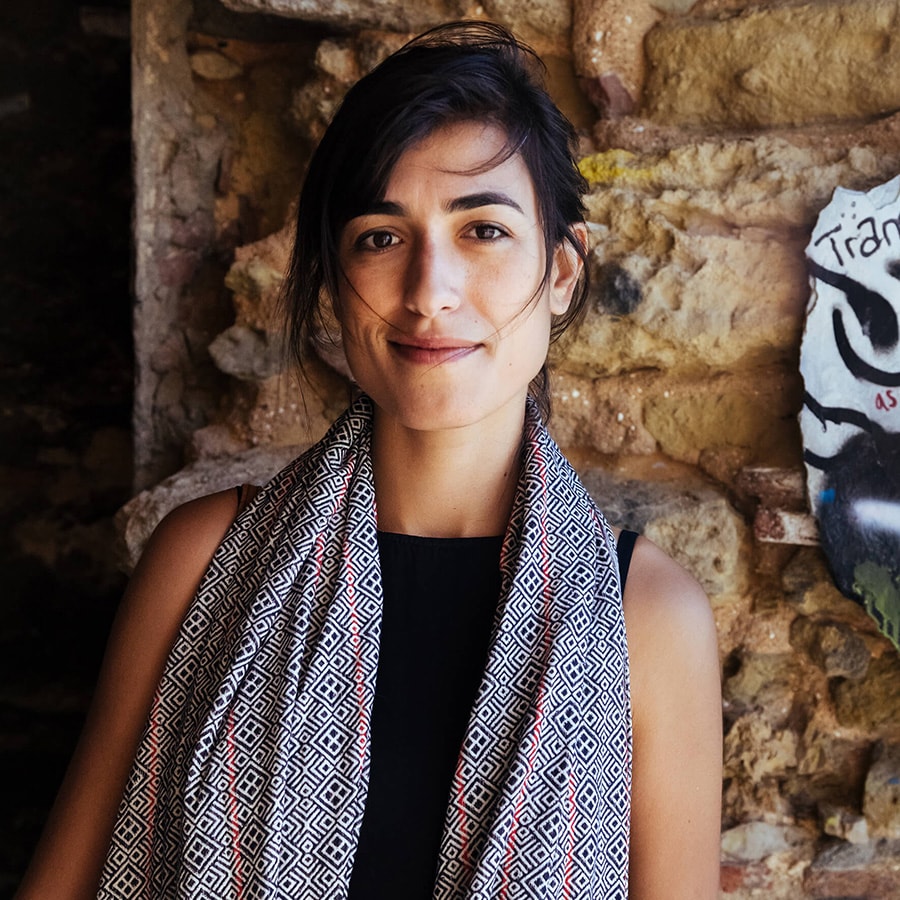
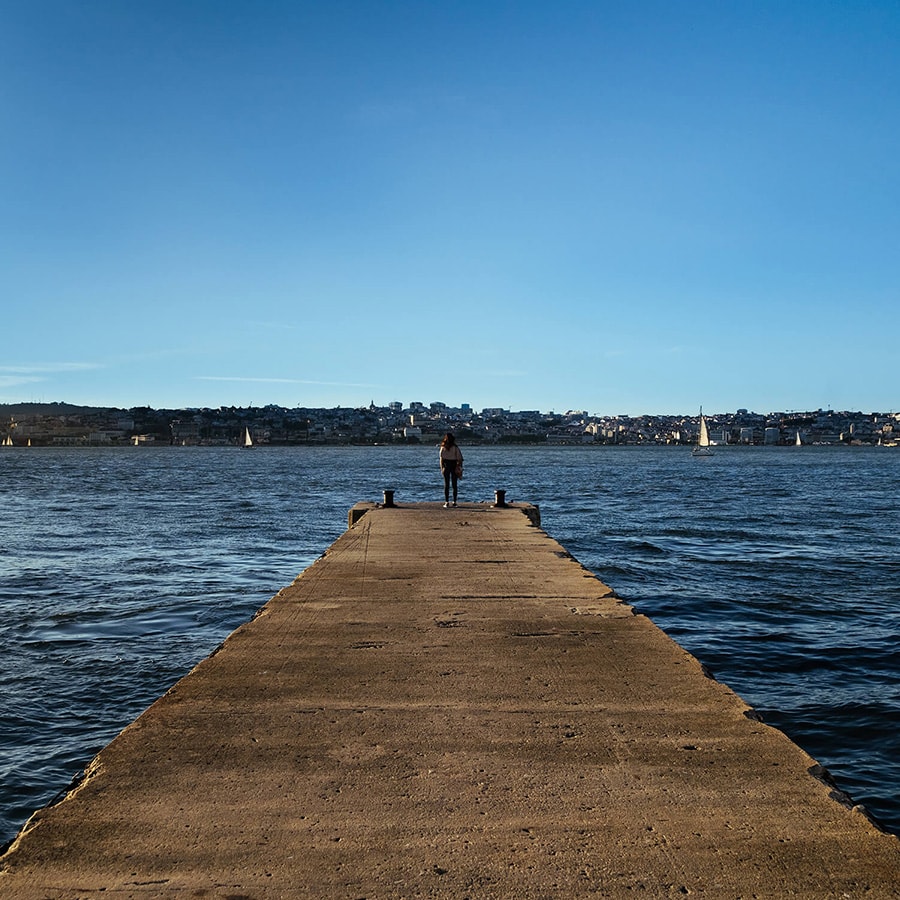
"It so happens that I'm a very quiet activist, which means that I know how to give priority to things."
"What could be done more slowly? To be with others. To be with yourself. To be. More slowly."
"I'm not from this time because I don't feel as old as I am. I'm a bit of an old soul."
"I like the wisdom that age brings."
"I love cooking, it's my Zen moment. I put on music and stay there for two, three hours. I like to refine and invent."
"It's not fair, they're taking people's time."
"With my grandmother I learned to enjoy being alone, to enjoy spending time with others in silence."
"I can be with my grandmother all afternoon in silence, doing something together."
"There is a level of harmony with the ecosystem that has already graduated on to the level of poetry. That spirit is very beautiful."
On a hot May afternoon, between coffees and glasses of water, we aimed for a rapid understanding: what is a free river, after all? The answer came in two parts: the first technical, and the second emotional. “Technically, a free river is one that has had no alteration to its morphology. That is, the bed and the banks were not altered, there was no artificial regularization of the river. This is very rare nowadays. Some changes are natural; the rivers are dynamic and can change their course. The question is when it’s us who are changing them: we decimate the ecosystem because it’s not in harmony with the dynamics of sand, fauna and flora. To completely change the physiognomy of a river is to block it. A study came out last week that says that only one third of the world’s main rivers are still free. It is the complete alteration of the natural laws of the planet, all in favor of capturing and building more.”
What about the emotional side? “I don’t know if you’ve ever gone rafting or canoeing. There’s another feeling there. The fact that you’re just one more in the middle of what’s around you versus being in a stagnant, rotten, almost lifeless lake of water. It’s not the same experience. It’s one of the few places that is still true.” So is a dam always a bad idea? “Careful: dams are necessary for a lot of things, and we will continue to need them for a long time to come. What we argue is that you don’t need so many. In a country like Portugal we are talking about 8,000 barriers in our rivers, between dams, large dams, small dams and mini hydroelectric dams. They are more than enough. Rivers are the veins of the Earth and the main natural cycles (of water, nitrogen, soil recovery), they are also the ones that transport the sediments that prevent coastal erosion. Blocking a river is like blocking a vein. The system may continue to live, but we’re going to have a serious health problem.”
